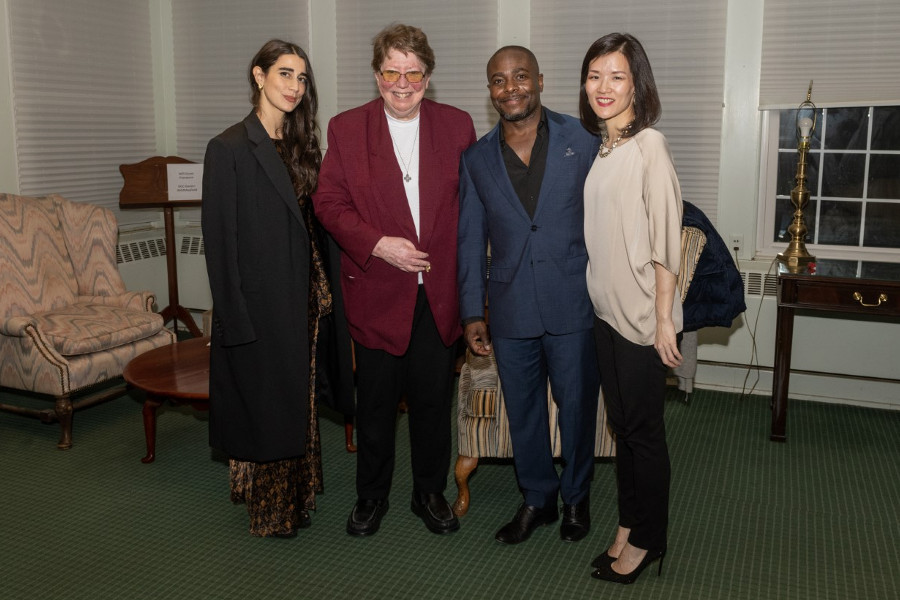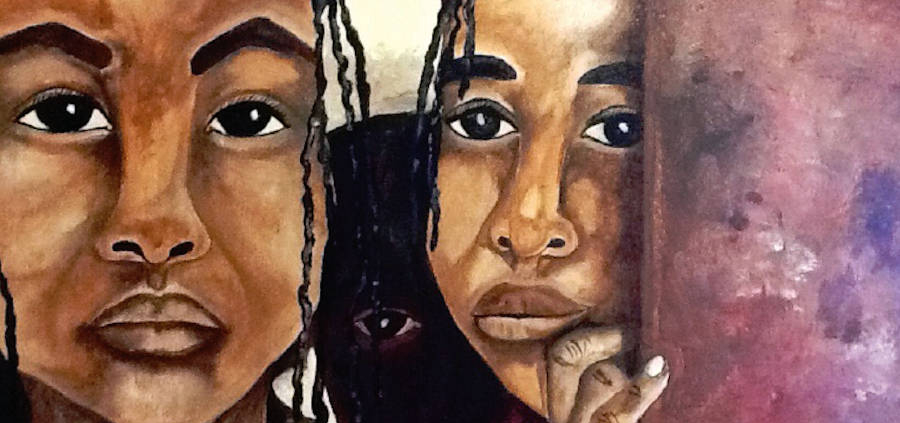“We Have a Concert!”: An Interview with Sister Lou Ella Hickman, OVISS
Hi Sister Lou Ella,
I just found out about a performance of “Chavah’s Daughters Speak.” It is in Cleveland on March 28.
I thought you would like to know.
All the best,
David
That David is David Murry, the editor and publishing manager of Subito Music Corporation in Verona, New Jersey. His company publishes the music of James Lee III, who put five of the poems from my poetry collection she: robed and wordless to music in a piece titled “Chavah’s Daughters Speak.” The concert was sponsored by the Cleveland Chamber Music Society. The only words I could muster to Sr. Annette Wagner, the superior of my community, were, “We have a concert!” I also told our communication person, Janel Benavides, who then approached me two days later and said, “You have to go.” And I went. To my delight, Sister Irma Gonzalez, one of my community sisters, was able to go with me. The Cleveland Incarnate Word Sisters not only housed and fed Sister Irma and me; five of them also attended the concert.
I would like to share some of the preconcert interview questions and my responses to Jarrett Hoffman for his online classical music journal ClevelandClassical.com. This will help give some of the background of the book, which is the context for “Chavah’s Daughters Speak,” and then a bit of the concert itself.
♦ ♦ ♦
Can you tell us a bit about your personal experience in researching for and writing she: robed and wordless and how your background may have influenced the project?
First, my background. I am a former Methodist. Even though Methodists are a fairly young group, they are part of the mainline Protestant faith communities who have had a love affair with the Bible for over 400 years. My master’s in theology specialized in Scripture studies. My theological education along with my background helped me to approach the text with an openness, respect, and a questioning mind. While I did employ some poetic license in writing, I had a difficult time reading material that obviously didn’t respect the text. That is, what it actually says. For example, while I am not a literalist, I know that Matthew’s gospel doesn’t mention of the number three for the Magi.
Also, I was aware that I could not correct some areas of popular knowledge. The Pharisees called the woman who washed Jesus’s feet “a sinner,” [so] popular knowledge has labeled her a prostitute. However, prostitution was not the only sin she might have committed. The fact that a woman touched Jesus’s feet would have been scandal enough. So, I used popular knowledge when I wrote the poem, “resurrection monologue: the woman who washed Jesus’ feet.” In my poem, this popular knowledge heightens Jesus’s unconditional acceptance and her struggle to come to terms with it.
When I read and reread the Biblical women’s stories I knew, I usually began with the question who is missing in the text. If the woman was present, and unnamed, I asked myself what in the context could suggest something about her. If she was absent, I would consider the question [of] what kind of woman would have been this man’s mother, or what kind of woman would have married this man. At one point, I printed out a list of women in the Scriptures as a starting point for my research. Not only did I read a great of material, I also sought out great art that would help me visualize—that is, give a face to the woman I was researching. I even incorporated a scene from a Jesus movie I had watched.
On another personal note, a great influence on my writing as a whole and, in particular, the poems in she: robed and wordless, was my mother. She was a voice major at North Texas University in Denton, Texas, before she decided to become a teacher. I think hearing her sing as I grew up helped me learn how to listen to the women in the Bible that became the voices in my book. In a way, James’s music brings my personal experience full circle.
What does poetry in particular, as opposed to other forms of writing, do to express the stories of these women?
Poetry is the ancient art of storytelling. These women’s stories continue that tradition. In fact, there are several places in the Hebrew Scriptures where both poetry and prose tell the same story. That is, the story is told once in poetry and then repeated in prose. And most Biblical scholars believe the poetry form came first because by its nature it would have been easier to remember. Including both the poetry and prose narratives in the text were two ways of telling a story that honors how people remember the who, what, and where of their history.
The poems in she: robed and wordless are dramatic monologues much in the same way Shakespeare used them in his plays. For example, the prologue in Romeo and Juliet is a poem as well as a dramatic monologue spoken by a chorus. Because it was a poem written by a master wordsmith, it sums up the entire play in a mere 14 lines. The power of poetry is hidden in the essentials and how they are expressed.

Left to right: Elena Perrori, Sister Lou Ella Hickman, OVISS, Anthony McGill, Myra Huag. Photo courtesy of Ronald Werman
How was the experience of hearing your words set to this music by James Lee III?
Thrilling. In a way, his music gives the women’s stories a validation only music can give.
Can you elaborate on the use of indentation in these poems?
I don’t know. Perhaps it is a combination of how I thought the woman’s internal monologue might have occurred. Perhaps these monologues are a verbal dance to silent music if you will. I had been asked beforehand to share a bit about what the poems meant to me. This occurred immediately after the intermission and just before “Chavah’s Daughters Speak” was performed. “Keep it to three minutes,” I was told. My comments, along with a poem I wrote for the occasion ran for about two minutes. Thank heavens, my writing strong point is brevity.
After the concert I was ushered backstage to meet the performers and be part of a photoshoot. After I handed a copy of my book to Elena Perroni, the soloist, we spoke for a few moments. Then she asked, “You have an accent, where are you from?” Even though I was a bit startled with her question, I hope I kept a straight face when I answered, “Texas.” As she hails from Australia, I thought she would sound more like Cate Blanchett. A good lesson in shattering preconceived ideas.
My poetic highlight of the evening came just moments before the photographer snapped the group picture. I turned to Anthony McGill [and said], “I understand I have you to thank for tonight’s concert.” I could have died happy on the spot when he responded, “I really like this concert venue. In fact, it is one of my favorites.”
Even though I have been a long time and devoted listener to music, I never thought how much it influenced my poetry until after the publication of my book. Since then, if a situation arises, I make it a point to write or verbally comment on how important it is for a writer to listen to music. Thanks to a talented composer who found music in my poems, I cannot help but believe that when a writer combines listening to music, avid reading, and traditional as well as creative research methods, they will be that much closer to success. ♦
Sister Lou Ella Hickman is a widely published poet and a member of the Sisters of the Incarnate Word and Blessed Sacrament of Corpus Christi, Texas. She has a master’s degree in theology and has taught on all levels, including college. Her poems and articles have been published in numerous magazines, including the anthology After Shocks: Poetry of Recovery for Life-Shattering Events. Sister Lou Ella’s book she: robed and wordless was published in 2015 as a Tom Lombardo Poetry Selection, an imprint of Press 53. It can be ordered here. Her article on the experience of having her poetry set to music is available at the Global Sisters Report here.





Leave a Reply
Want to join the discussion?Feel free to contribute!